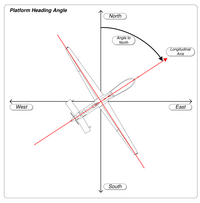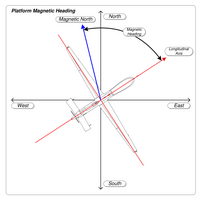What Can Be Tracked In An Uploaded Course On Cornertson

Instruments used to plot a form on a nautical or aeronautical chart.
In navigation, the course of a watercraft or shipping is the cardinal direction in which the craft is to be steered. The grade is to be distinguished from the heading, which is the compass management in which the craft's bow or nose is pointed.[1] [2] [3]
Form, track, road and heading [edit]


Truthful heading (left) and magnetic heading (right)

Heading and track (A to B)
1 – Truthful Due north
2 – Heading, the direction the vessel is "pointing towards"
iii – Magnetic north, which differs from true n past the magnetic variation.
4 – Compass due north, including a ii-part error; the magnetic variation (6) and the ship's own magnetic field (5)
v – Magnetic departure, caused by vessel'due south magnetic field.
6 – Magnetic variation, caused by variations in earth'southward magnetic field.
7 – Compass heading or compass class, before correction for magnetic deviation or magnetic variation.
8 – Magnetic heading, the compass heading corrected for magnetic deviation but not magnetic variation; thus, the heading reliative to magnetic north.
9, 10 – Furnishings of crosswind and tidal current, causing the vessel's track to differ from its heading.
A, B – Vessel's track.
The path that a vessel follows over the ground is chosen a ground track, class made adept or course over the ground.[1] For an shipping it is simply its track.[3] The intended track is a route. For ships and shipping, routes are typically direct-line segments between waypoints. A navigator determines the bearing (the compass direction from the arts and crafts's current position) of the next waypoint. Because h2o currents or wind can cause a craft to drift off form, a navigator sets a grade to steer that compensates for drift. The helmsman or airplane pilot points the craft on a heading that corresponds to the course to steer. If the predicted drift is correct, then the craft's track volition represent to the planned course to the next waypoint.[one] [iii] Course directions are specified in degrees from north, either true or magnetic. In aviation, north is usually expressed every bit 360°.[iv] Navigators used ordinal directions, instead of compass degrees, e.one thousand. "northeast" instead of 45° until the mid-20th century when the utilise of degrees became prevalent.[five]
See likewise [edit]
- Acronyms and abbreviations in avionics
- Bearing (navigation)
- Breton plotter
- E6B
- Ground track
- Navigation
- Navigation room
- Rhumb line
Notes [edit]
- ^ a b c Bartlett, Tim (2008), Adlard Coles Book of Navigations, Adlard Coles, p. 176, ISBN978-0713689396
- ^ Husick, Charles B. (2009). Chapman Piloting, Seamanship and Small Gunkhole Handling. Sterling Publishing Visitor, Inc. p. 927. ISBN9781588167446.
- ^ a b c Federal Aviation Administration (FAA) (2016-09-25). Pilot's Handbook of Aeronautical Knowledge: FAA-H-8083-25B. Ravenio Books.
- ^ Michael Nolan (2010). Fundamentals of Air Traffic Command. Cengage Learning. p. 201. ISBN978-i-4354-8272-2.
For example, a rail heading north would accept a magnetic heading of 360°.
- ^ Rousmaniere, John; Smith, Mark (1999). The Annapolis Book of Seamanship: Third Edition: Completely Revised, Expanded and Updated. Simon and Schuster. p. 234. ISBN9780684854205.
References [edit]
- Pilot'due south Handbook of Aeronautical Knowledge
- glossary
Source: https://en.wikipedia.org/wiki/Course_(navigation)
Posted by: carrollcieved.blogspot.com


0 Response to "What Can Be Tracked In An Uploaded Course On Cornertson"
Post a Comment